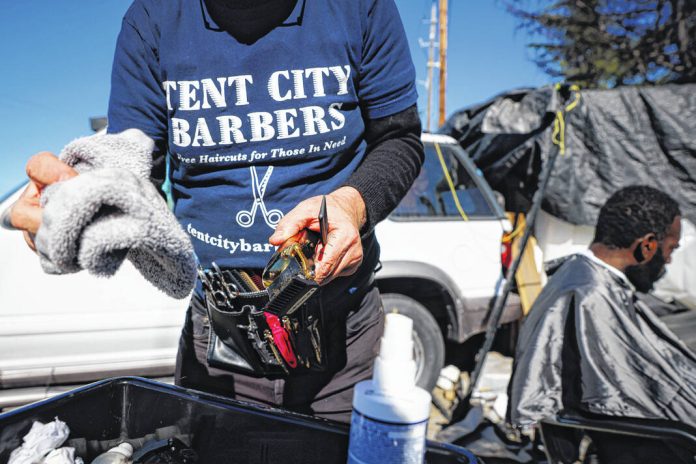Six tents sit along the side of Seaport Boulevard in Redwood City, California, tucked between rock quarries and a refinery.
There are no houses in the area. Just a railroad track, some warehouses and the water.
Drivers who pass by would miss it if they blink. Or perhaps the sight of encampments has become so common in the Bay Area today that seeing one is no longer unusual.
But for Joseph Kautz, a professional beautician and substitute teacher from Redwood City, he goes to Bay Area encampments to give haircuts for free to people down on their luck, who struggle with poverty, addiction, and chronic homelessness, precisely to help them be seen.
“Beauty will save the world,” said Kautz, who is fluent in Russian, citing novelist Fyodor Dostoevsky.
“Beauty is very powerful. We’re here to do one thing. I’m here to give a haircut,” he says while clipping away at a client’s locks. “When you look better, there is real power in that. Sometimes you just need the wind to change just a little bit.”
The idea to give free haircuts to the homeless began prior to the COVID-19 pandemic when Kautz was living in Seattle after finishing beauty school in San Mateo. He came across a homeless encampment near a supermarket where unhoused people asked him if he could give them haircuts. And that’s how Tent City Barbers was born in 2019.
Kautz, who used to head the digital language lab at Stanford University, eventually returned to the Bay Area, where he started providing haircuts for unhoused people across the Bay Area.
San Mateo County has garnered criticism from some – and praise from others – for adopting a harsher approach to homeless encampments compared to other counties in the Bay Area. Those caught living in unincorporated areas in San Mateo County can face misdemeanor charges if they refuse to go to shelters after two warnings.
But for some who have experienced living in shelters, getting a bed is the easier part. It’s staying there that’s difficult.
Scott Llewellyn, who was getting a haircut from Kautz, said he ended up at the encampment after being kicked out of a local shelter after he was allegedly attacked by another person two months ago.
Llewellyn used to work at a restaurant in San Francisco at the beginning of the pandemic. He was five years sober and things were looking up.
About a year ago, he relapsed, and ended up on hard times again.
He’s not a bad person, Llewellyn says. And wants to get back on his feet again.
But the challenges one faces on the streets can be a trap.
Llewellyn said that one time he was accosted for simply riding his bike near a shopping center.
Kautz says he strongly believes that “nothing gives you away as someone who doesn’t fit in society more than your hair. It’s more telling than your clothes. It’s like, that guy’s hair is jacked up, he or she is not safe to be around.”
And a haircut can help someone.
Llewellyn, who wants to get a job and be in a normal apartment again, said he appreciates services like Tent City Barbers who can help him out with a haircut.
“We all, at some point, were doing good,” he said. “I don’t need sympathy. I just need understanding that anyone can end up here.”
Hope is hard to come by for those living in poverty.
Yet, hope is a shared feeling among those living in the Redwood City encampment.
Garnett Pittman, who is originally from East Oakland, has been living on the streets since 2008 when his foster mom died.
Yet, he, too, has hope that he’ll be able to get off the streets soon – the only life he’s known for over 15 years.
Pittman got a simple shave from Tent City Barbers. He used to have a job working at an airport as a cargo handler. “I loved it,” he said. “I hope I can get a job like that again.”
But even if there are retail stores and restaurants hiring around the Peninsula, getting a job isn’t that simple for people living in encampments.
The East Oakland native has had run-ins with police and has a criminal record. But he has a daughter who is staying in San Francisco with her mother.
And that’s where he draws his hope.
“I’m living day to day. But because of her, I’m trying to get back on my feet,” Pittman said.
Stories like his and Llewellyn’s are all too common for Kautz, who goes out to cut hair almost every weekend and days where he’s not working as a substitute teacher. “These are my people,” he said.
Kautz himself said he’s experienced homelessness and has also bounced backed from addiction.
While he’s not under any illusion that a haircut can pull people out of homelessness, “like a ship, you just have to steer them in the right direction,” he said.
He recently incorporated his advocacy to cut the hair of the unhoused into a 501(c)(3) nonprofit, which he hopes can help him continue to steer more people on the right path.
“Tent City Barbers helps everyone address their vanity. We love hair. And we love to cut hair,” Kautz said. “There’s not much more to it than that.”







